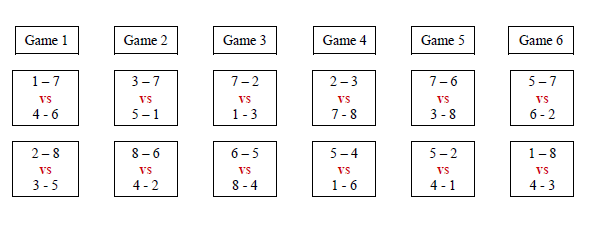Lisa99
Thinks s/he gets paid by the post
- Joined
- Aug 5, 2010
- Messages
- 1,440
I have volunteered to help set up a round robin tournament for my pickleball club. Unfortunately this math challenged person has been given the task of setting up who plays against whom in each of 8 rounds.
Here's the task. There are 8 rounds and depending on the number of players there can be more than one game in each round. For each game there are 4 players (two sets of two) but they are playing as individuals rather than partners that stay together.
Once round 1 is over, rounds 2 - 8 have to be a different combination of players so that by the end of 8 rounds everyone will have played with and against all other players (this is a no elimination tournament and at the end the person with the highest total score wins)
I have to set up 8 rounds for 4 players, another for 5 players, another for 6 players, and a final one for 7 players. I believe byes will need to be involved for all but the 4 player scenario.
If you have any idea how to do this I'd love guidance! I've scoured google and have come up with nothing that I remotely understand.
Here's the task. There are 8 rounds and depending on the number of players there can be more than one game in each round. For each game there are 4 players (two sets of two) but they are playing as individuals rather than partners that stay together.
Once round 1 is over, rounds 2 - 8 have to be a different combination of players so that by the end of 8 rounds everyone will have played with and against all other players (this is a no elimination tournament and at the end the person with the highest total score wins)
I have to set up 8 rounds for 4 players, another for 5 players, another for 6 players, and a final one for 7 players. I believe byes will need to be involved for all but the 4 player scenario.
If you have any idea how to do this I'd love guidance! I've scoured google and have come up with nothing that I remotely understand.
Last edited:


